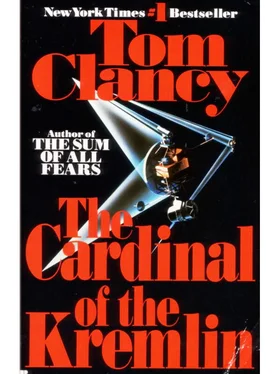Tom Clancy - The Cardinal of the Kremlin
Здесь есть возможность читать онлайн «Tom Clancy - The Cardinal of the Kremlin» весь текст электронной книги совершенно бесплатно (целиком полную версию без сокращений). В некоторых случаях можно слушать аудио, скачать через торрент в формате fb2 и присутствует краткое содержание. Год выпуска: 1988, Жанр: Триллер, на английском языке. Описание произведения, (предисловие) а так же отзывы посетителей доступны на портале библиотеки ЛибКат.
- Название:The Cardinal of the Kremlin
- Автор:
- Жанр:
- Год:1988
- ISBN:нет данных
- Рейтинг книги:3 / 5. Голосов: 1
-
Избранное:Добавить в избранное
- Отзывы:
-
Ваша оценка:
- 60
- 1
- 2
- 3
- 4
- 5
The Cardinal of the Kremlin: краткое содержание, описание и аннотация
Предлагаем к чтению аннотацию, описание, краткое содержание или предисловие (зависит от того, что написал сам автор книги «The Cardinal of the Kremlin»). Если вы не нашли необходимую информацию о книге — напишите в комментариях, мы постараемся отыскать её.
The Cardinal of the Kremlin — читать онлайн бесплатно полную книгу (весь текст) целиком
Ниже представлен текст книги, разбитый по страницам. Система сохранения места последней прочитанной страницы, позволяет с удобством читать онлайн бесплатно книгу «The Cardinal of the Kremlin», без необходимости каждый раз заново искать на чём Вы остановились. Поставьте закладку, и сможете в любой момент перейти на страницу, на которой закончили чтение.
Интервал:
Закладка:
"Good morning, Comrade General Secretary." "You need not be so formal, Ilya Arkadyevich. There are Politburo members more senior to you who do not have the vote, and we have been comrades too… long. What is troubling you?" Narmonov asked cautiously. The pain in his colleague's eyes was evident. They were scheduled to talk about the winter wheat crop, but –
"Andrey Il'ych, I do not know how to begin." Vaneyev nearly choked on the words, and tears began to stream from his eyes. "It is my daughter…" He went on for ten fitful minutes.
"And?" Narmonov asked, when it seemed that he'd finally stopped – but as was obvious, there had to be more. There was.
"Alexandrov and Gerasimov, then." Narmonov leaned back in his chair and stared at the wall. "It took great courage indeed for you to come to me with this, my friend."
"I cannot let them – even if it means my career, Andrey, I cannot let them stop you now. You have too many things to do, we – you have too many things to change. I must leave. I know that. But you must stay, Andrey. The people need you here if we are to accomplish anything."
It was noteworthy that he'd said people rather than Party , Narmonov thought. The times really were changing. No. He shook his head. It wasn't that, not yet. All he had accomplished was to create the atmosphere within which the times might have the possibility of change. Vaneyev was one who understood that the problem was not so much goals as process. Every Politburo member knew – had known for years – the things that needed to be changed. It was the method of change that no one could agree on. It was like turning a ship to a new course, he thought, but knowing that the rudder might break if you did so. Continuing in the same path would allow the ship to plow on into… what? Where was the Soviet Union heading? They didn't even know that. But to change course meant risk, and if the rudder broke – if the Party lost its ascendancy – then there would be only chaos. That was a choice that no rational man would wish to face, but it was a choice whose necessity no rational man could deny.
We don't even know what our country is doing , Narmonov thought to himself. For at least the past eight years all figures on economic performance had been false in one way or another, each compounding itself on the next until the economic forecasts generated by the GOSPLAN bureaucracy were as fictitious as the list of Stalin's virtues. The ship he commanded was running deeper and deeper into an enveloping fog of lies told by functionaries whose careers would be destroyed by the truth. That was how he spoke of it at the weekly Politburo meetings. Forty years of rosy goals and predictions had merely plotted a course on a meaningless chart. Even the Politburo itself didn't know the state of the Soviet Union – something the West hardly suspected.
The alternative? That was the rub, wasn't it? In his darker moments, Narmonov wondered if he or anyone else could really change things. The goal of his entire political life had been to achieve the power that he now held, and only now did he fully understand how circumscribed that power was. All the way up the ladder of his career he'd noted things that had to change, never fully appreciating how difficult that would be. The power he wielded wasn't the same as Stalin's had been. His more immediate predecessors had seen to that. Now the Soviet Union wasn't so much a ship to be guided, as a huge bureaucratic spring that absorbed and dissipated energy and vibrated only to its own inefficient frequency. Unless that changed… the West was racing into a new industrial age while the Soviet Union still could not feed itself, China was adopting the economic lessons of Japan, and in two generations might become the world's third economy: a billion people with a strong, driving economy, right on our border, hungry for land, and with a racial hatred of all Russians that could make Hitler's fascist legions seem like a flock of football hooligans. That was a strategic threat to his country that made the nuclear weapons of America and NATO shrivel to insignificance – and still the Party bureaucracy didn't see that it had to change or risk being the agent of its own doom!
Someone has to try, and that someone is me.
But in order to try, he first had to survive himself, survive long enough to communicate his vision of national goals, first to the Party, then to the people – or perhaps the other way around? Neither would be easy. The Party had its ways, resistant to change, and the people, the narod , no longer gave a moment's thought to what the Party and its leader said to them. That was the amusing part. The West – the enemies of his nation – held him in higher esteem than his own countrymen.
And what does that mean? he asked himself. If they an enemies, does their favor mean that I am proceeding on the right path – right for whom? Narmonov wondered if the American President were as lonely as he. But before facing that impossible task, he still had the day-to-day tactical problem of personal survival. Even now, even at the hands of a trusted colleague. Narmonov sighed. It was a very Russian sound.
"So, Ilya, what will you do?" he asked a man who could not commit an act of treason more heinous than his daughter's.
"I will support you if it means my disgrace. My Svetlana will have to face the consequences of her action." Vaneyev sat upright and wiped his eyes. He looked like a man about to face a firing squad, assembling his manhood for one last act of defiance.
"I may have to denounce you myself," Narmonov said.
"I will understand, Andrushka," Vaneyev replied, his voice laden with dignity.
"I would prefer not to do this. I need you, Ilya. I need your counsel. If I can save your place, I will."
"I can ask for no more than that."
It was time to build the man back up. Narmonov stood and walked around his desk to take his friend's hand. "Whatever they tell you, agree to it without reservation. When the time comes, you will show them what kind of man you are."
"As will you, Andrey."
Narmonov walked him to the door. He had another five minutes till his next scheduled appointment. His day was full of economic matters, decisions that came to him because of indecision in men with ministerial rank, seeking him for his blessing as though from the village priest… As though I don't have troubles enough , the General Secretary of the Communist Party of the Soviet Union told himself. He spent his five minutes counting votes. It should have been easier for him than for his American counterpart – in the Soviet Union only full Politburo members had the right to vote, and there were only thirteen of them – but each man represented a collection of interests, and Narmonov was asking each of them to do things never before contemplated. In the final analysis, power still counted for more than anything else, he told himself, and he could still count on Defense Minister Yazov.
"I think you will like it here," General Pokryshkin said as they walked the perimeter fence. The KGB guards saluted as they passed, and both men returned the halfhearted gestures. The dogs were gone now, and Gennady thought that a mistake, food problems or no.
"My wife will not," Bondarenko replied. "She's followed me from one camp to another for almost twenty years, and finally to Moscow. She likes it there." He turned to look outside the fence and smiled. Could a man ever tire of this view? But what will my wife say when I tell her this? But it was not often that a Soviet soldier had the chance to make this sort of choice, and she would understand that, wouldn't she?
"Perhaps general's stars will change her mind – and we are working to make the place more hospitable. Do you have any idea how hard I had to fight for that? Finally I told them that my engineers were like dancers, and that they had to be happy to perform. I think that Central Committeeman is a devotee of the Bolshoy, and that finally made him understand. That's when the theater was authorized, and that's when we started getting decent food trucked in. By next summer the school will be finished, and all the children will be here. Of course" – he laughed – "we'll have to put up another block of apartments, and the next Bright Star commander will also have to be a schoolmaster."
Читать дальшеИнтервал:
Закладка:
Похожие книги на «The Cardinal of the Kremlin»
Представляем Вашему вниманию похожие книги на «The Cardinal of the Kremlin» списком для выбора. Мы отобрали схожую по названию и смыслу литературу в надежде предоставить читателям больше вариантов отыскать новые, интересные, ещё непрочитанные произведения.
Обсуждение, отзывы о книге «The Cardinal of the Kremlin» и просто собственные мнения читателей. Оставьте ваши комментарии, напишите, что Вы думаете о произведении, его смысле или главных героях. Укажите что конкретно понравилось, а что нет, и почему Вы так считаете.






![Александр Ирвин - Tom Clancy’s The Division 2. Фальшивый рассвет [litres]](/books/417744/aleksandr-irvin-tom-clancy-s-the-division-2-falsh-thumb.webp)





